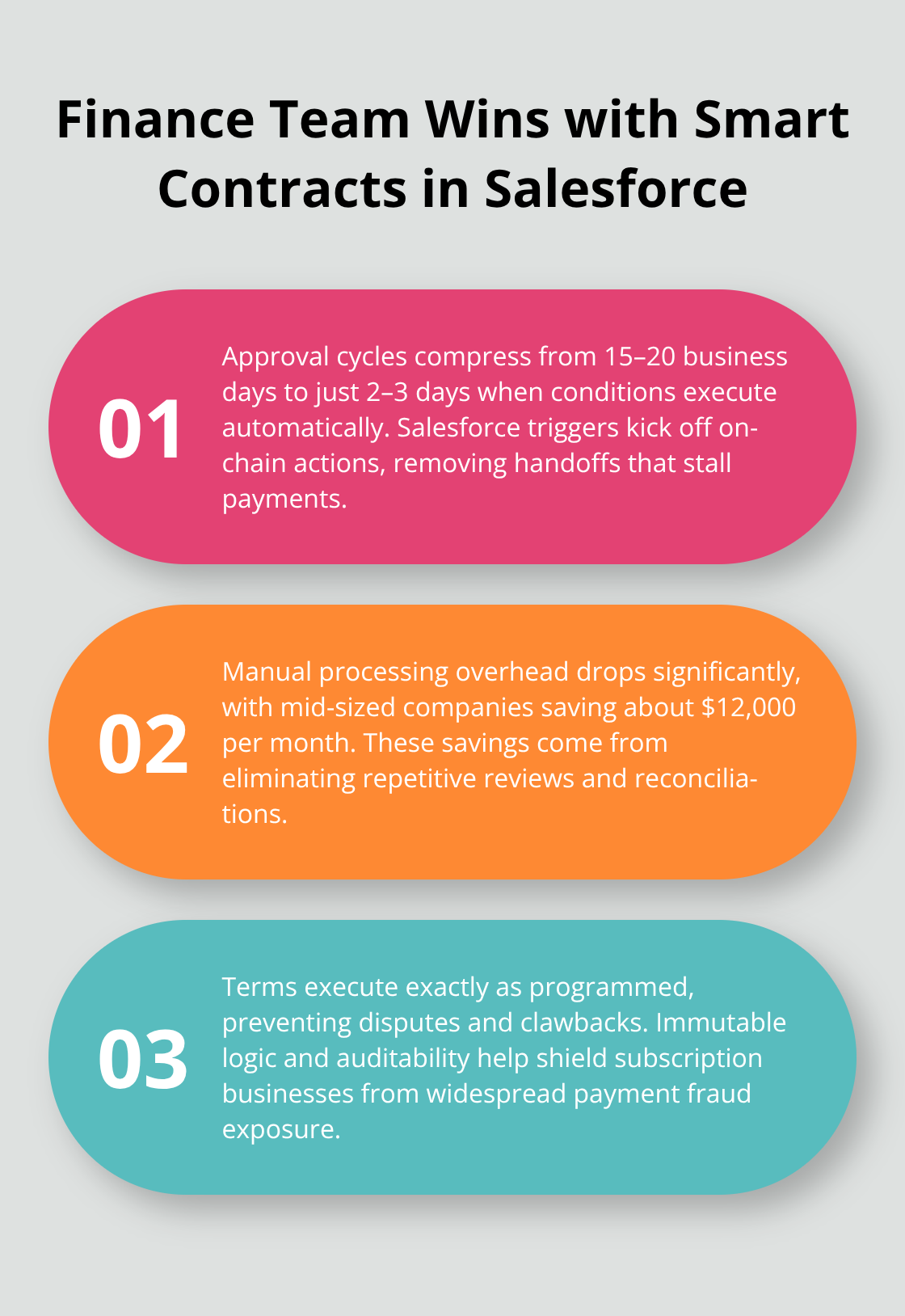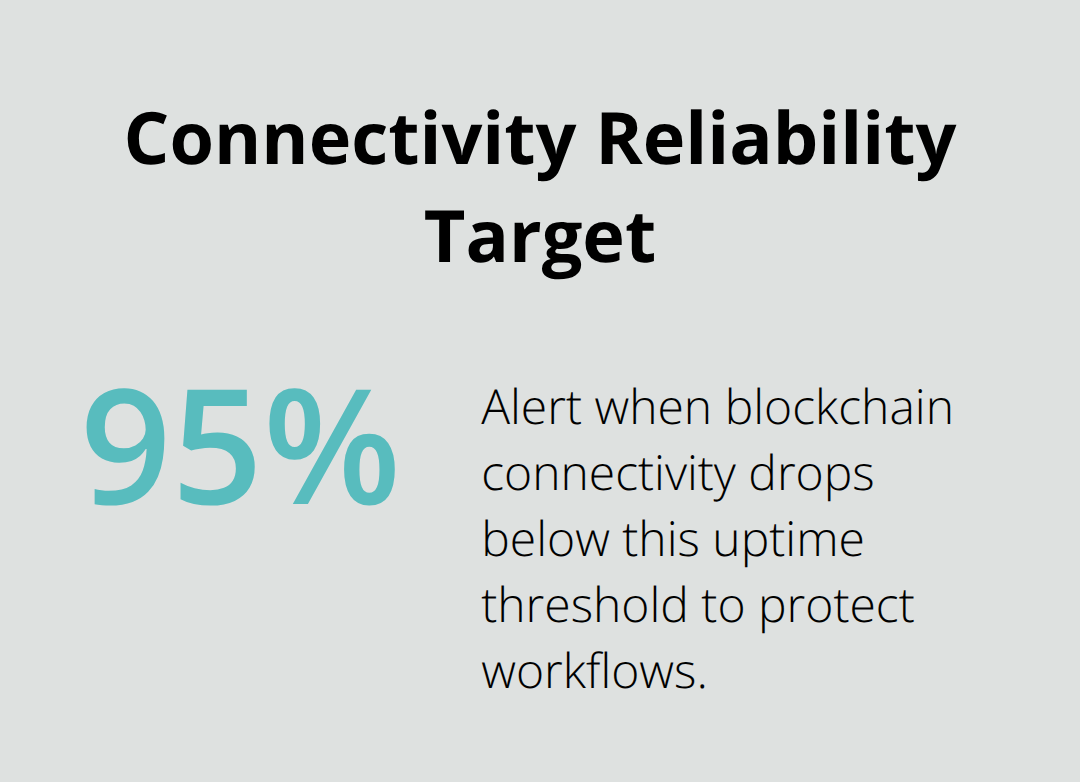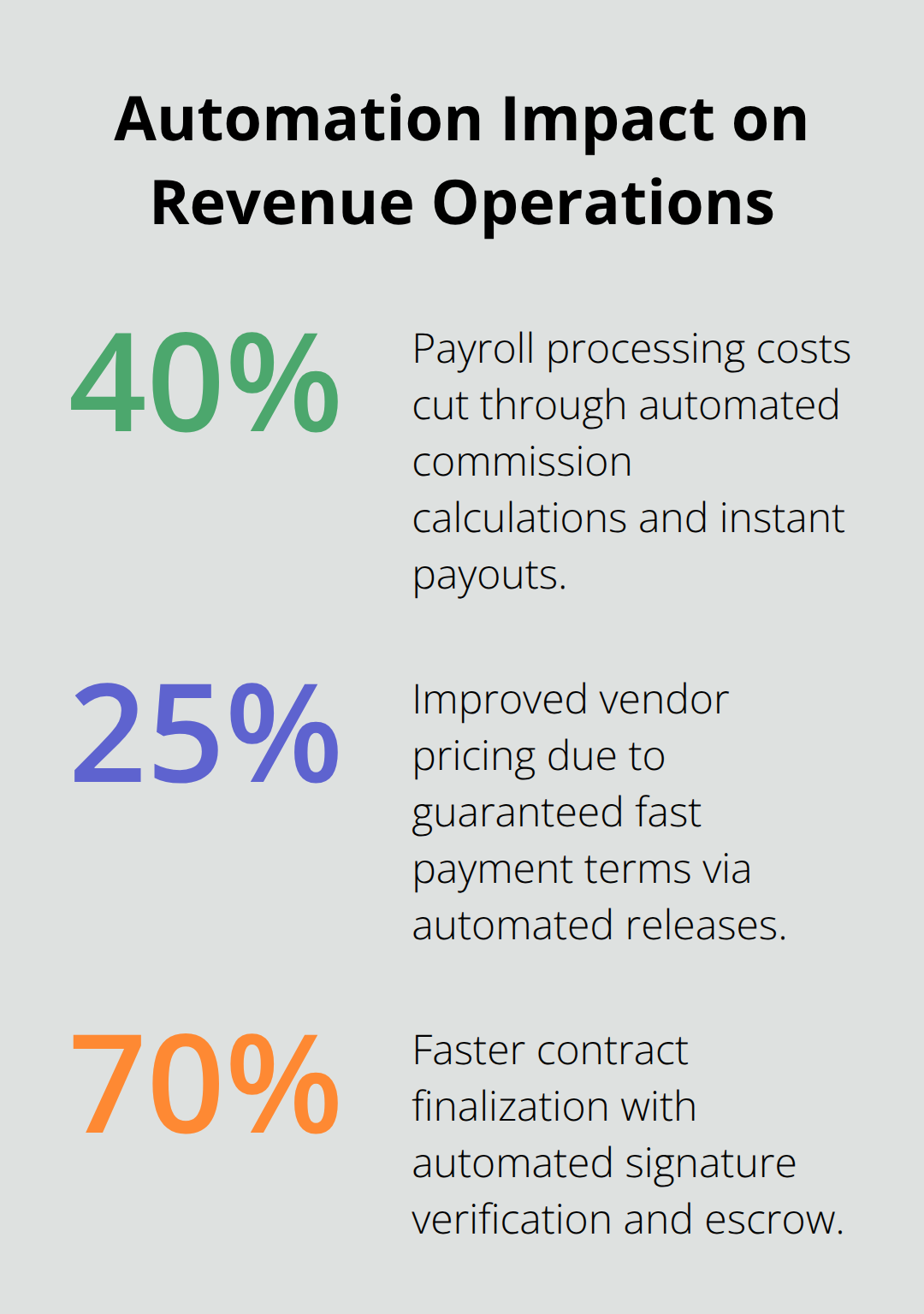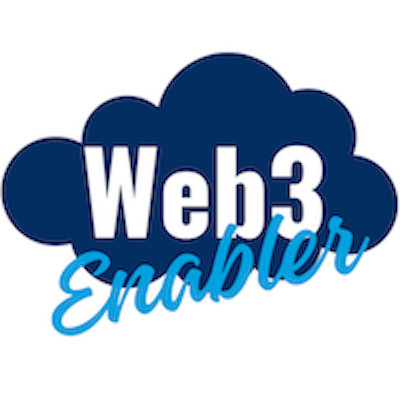 Smart contracts are transforming how enterprises handle automated agreements and payments. These self-executing programs eliminate manual processes while reducing costs by up to 30% according to recent Deloitte research.
Smart contracts are transforming how enterprises handle automated agreements and payments. These self-executing programs eliminate manual processes while reducing costs by up to 30% according to recent Deloitte research.
We at Web3 Enabler see growing demand from finance teams seeking seamless blockchain integration with existing Salesforce workflows. This guide shows you exactly how to implement these powerful automation tools in your CRM ecosystem.
How Do Smart Contracts Work Within Salesforce
Smart contracts are programmable agreements that execute automatically when predetermined conditions are met. These digital contracts operate on blockchain networks like Ethereum or Polygon and contain code that triggers specific actions such as payment releases, record updates, or ownership transfers without human intervention.
When you integrate smart contracts with Salesforce, you create a powerful bridge between your CRM data and blockchain automation. The integration works through API connections that monitor smart contract events and sync relevant data back to your Salesforce records in real-time.
Immediate Business Benefits for Finance Teams
Finance teams experience faster payment processing when smart contracts handle invoice approvals and vendor payments automatically. Traditional contract workflows with multiple approval stages take 15-20 business days, while smart contract automation reduces this timeline to 2-3 days.
The elimination of manual payment processing cuts administrative costs by an average of $12,000 per month for mid-sized companies. Smart contracts remove payment disputes since they execute terms exactly as programmed, protecting against the $31 billion in annual payment fraud that affects subscription businesses.

Enterprise Applications That Drive ROI
Sales teams use smart contracts to automate commission calculations and instant payouts when deals close in Salesforce. This approach eliminates month-end reconciliation processes entirely.
Procurement departments deploy smart contracts for automatic vendor payments upon delivery confirmation. IoT sensors trigger payment release when goods arrive at their destination. Customer onboarding workflows benefit from smart contracts that automatically activate services and billing once compliance documents are verified and uploaded to Salesforce.
International businesses leverage smart contracts for cross-border payments, avoiding traditional banking delays and reducing transaction costs from 3-5% to under 1%.
Technical Architecture and Data Flow
The technical implementation requires establishing secure API connections between your Salesforce org and blockchain networks. Smart contracts monitor specific triggers within your CRM data (such as opportunity stage changes or contract approvals) and execute predetermined actions on the blockchain.
Data flows bidirectionally – Salesforce sends transaction triggers to smart contracts, while blockchain events update relevant CRM records automatically. This creates a seamless workflow where your sales team continues working within familiar Salesforce interfaces while blockchain automation handles complex backend processes.
Now that you understand how smart contracts integrate with Salesforce, the next step involves setting up the technical infrastructure to support these powerful automation capabilities.
How Do You Build the Technical Infrastructure
Blockchain connectivity in Salesforce demands a robust API architecture that handles both inbound and outbound data flows. The most effective approach involves middleware solutions that act as translation layers between Salesforce’s REST APIs and blockchain networks. Companies like JPMorgan and Walmart have successfully implemented similar architectures with Oracle blockchain middleware, which processes over 10,000 transactions daily while maintaining sub-second response times.
API Gateway Configuration and Webhook Management
Your API gateway must handle multiple blockchain networks simultaneously since enterprise applications often require redundancy across Ethereum mainnet and Layer 2 solutions like Polygon. Configure webhook endpoints in Salesforce to receive smart contract events and update CRM records automatically. The webhook system should include retry mechanisms with exponential backoff to handle network congestion (Ethereum can experience delays of up to 15 minutes during peak usage periods).
Deploy monitoring tools that track API response times and alert administrators when blockchain connectivity drops below 95% uptime. Smart contract events trigger Salesforce workflow rules that update opportunity stages, create payment records, or send automated notifications to sales teams.

Data Security and Access Control Framework
Multi-signature wallets require multiple private keys to authorize transactions, providing enhanced security for smart contracts handling financial operations. Enterprise security requires separation of read-only blockchain queries from transaction operations through different API keys and access levels. Store private keys in hardware security modules or enterprise key management systems – never within Salesforce custom settings or metadata.
Configure IP whitelisting for all blockchain API endpoints and implement OAuth 2.0 authentication with token refresh cycles every 24 hours. Regular security audits should verify that smart contract permissions align with Salesforce user roles, which prevents unauthorized transaction approvals that could cost companies thousands in fraudulent payments.
Real-Time Data Synchronization
Smart contracts generate events that must sync with Salesforce records in real-time to maintain data accuracy. Configure your middleware to parse blockchain events and map them to specific Salesforce objects and fields. Transaction confirmations update opportunity amounts, payment statuses change invoice records, and contract executions trigger automated workflows.
The synchronization process requires error handling for failed transactions and rollback mechanisms when blockchain operations don’t complete successfully. Never build custom blockchain connections from scratch unless you have dedicated development resources. This technical foundation supports the business process automation that transforms how your teams handle contracts, payments, and vendor relationships.
How Smart Contracts Transform Your Business Operations
Smart contracts eliminate the manual bottlenecks that cost enterprises millions in delayed payments and administrative overhead. Sales teams at companies like IBM now process commission payouts within 24 hours of deal closure instead of waiting for month-end calculations. The smart contract automatically calculates commission percentages based on Salesforce opportunity data and releases payments instantly when opportunities reach closed-won status. This automation cuts payroll processing costs by 40% while improving sales team satisfaction through faster compensation cycles.
Automated Vendor Payments Cut Processing Time
Procurement departments achieve massive efficiency gains through automated vendor payments tied to delivery confirmations. Smart contracts monitor shipment tracking APIs and release payments automatically when goods reach their destination, eliminating the 15-day average payment delay that strains supplier relationships. Companies using this approach report 25% better vendor pricing negotiations due to guaranteed fast payment terms. The blockchain records create immutable audit trails that satisfy compliance requirements while reducing accounts payable workload by 60%. Traditional three-way matching processes between purchase orders, receipts, and invoices become obsolete when smart contracts handle verification automatically.
Customer Onboarding Acceleration Boosts Revenue Recognition
Customer onboarding workflows benefit dramatically from smart contract automation that activates services immediately upon compliance document verification. Financial services firms reduce account opening timelines from 14 days to under 4 hours through automated KYC verification and instant service provisioning. Smart contracts monitor document uploads in Salesforce and cross-reference them against regulatory databases before they trigger account activation and billing commencement. This acceleration allows companies to recognize revenue faster while maintaining strict compliance standards (eliminating the 30% of onboarding delays caused by human error in compliance checks).

Contract Execution Speed Transforms Deal Closure
Sales contracts execute automatically when all parties meet predetermined conditions stored in the smart contract code. Legal teams report 70% faster contract finalization when smart contracts handle signature verification and payment escrow simultaneously. The automated system validates contract terms against Salesforce opportunity data and releases funds only when delivery milestones are confirmed. This approach eliminates the average 12-day delay between contract signature and payment processing that traditionally impacts cash flow projections.
Final Thoughts
Smart contracts deliver measurable ROI through automated payment processes, reduced administrative costs, and faster deal closure cycles. Companies that implement these solutions report 30% cost reductions and 70% faster contract finalization while they eliminate payment disputes entirely. Your implementation roadmap should begin with the identification of high-volume, repetitive processes that drain resources.
Start with vendor payments or commission calculations where automation provides immediate value. Establish secure API connections between Salesforce and blockchain networks, then gradually expand to customer onboarding and contract execution workflows. Success requires proper technical infrastructure with multi-signature security, real-time data synchronization, and comprehensive monitoring systems (focus on processes where smart contracts eliminate manual bottlenecks rather than attempt organization-wide transformation immediately).
Enterprise blockchain adoption accelerates when you partner with proven solutions that integrate seamlessly with existing systems. Web3 Enabler provides native Salesforce support for blockchain transactions, which enables faster global payments and digital asset management within your familiar CRM environment. This approach transforms your Salesforce ecosystem into a powerful automation platform that drives competitive advantage through reduced costs and improved operational efficiency.







